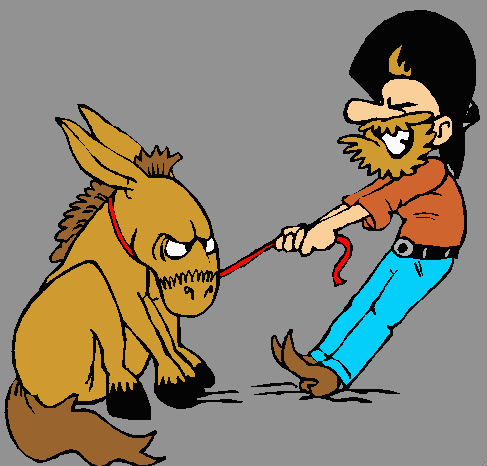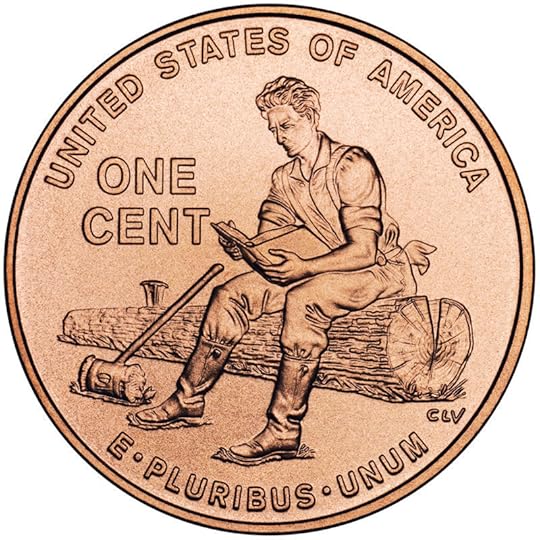Short & Sweet Treats discussion
Take a Coffee Break...
>
Word of the Day
 Pervicacious [per·vi·ca·cious]
Pervicacious [per·vi·ca·cious] [pur-vi-key-shuhs]
Adj. Stubborn, extremely willful, obstinate.
Origin:
1625–35; < Latin pervicāc-, stem of pervicāx stubborn, willful ( per- per- + vic-, variant stem of vincere to conquer (see victor) + -āx adj. suffix denoting tendency or ability) + -ious
“He became quite pervicacious in his old age.”

 INOCCIDUOUS
INOCCIDUOUSof a star, never setting
"Polaris, the North Star, was his inocciduous guide as he trekked across the Great Plains."

 Ashley wrote: "Pervicacious [per·vi·ca·cious]
Ashley wrote: "Pervicacious [per·vi·ca·cious] [pur-vi-key-shuhs]
Adj. Stubborn, extremely willful, obstinate.
Origin:
1625–35; < Latin pervicāc-, stem of pervicāx stubborn, willful ( per- per- + vic-, vari..."
Describes my personality!
 mossback
mossbackPRONUNCIATION:
(MOS-bak)
MEANING:
noun: A very old-fashioned person or one holding extremely conservative views.
ETYMOLOGY:
From the idea that someone is old enough to have moss grow on his back. Old aquatic animals, such as turtles, do develop mosslike growth on their backs. Earliest documented use: 1865.
USAGE:
"Here, Markowitz deals with ... moldy old mossbacks in English departments who won't teach writing by women."
Miriam Markowitz; Here Comes Everybody; The Nation (New York); Dec 9, 2013.

 misanthrope
misanthropePRONUNCIATION:
(MIS-uhn-throp, MIZ-)
MEANING:
noun: One who dislikes people in general.
ETYMOLOGY:
From Greek misanthropos, from misos (hatred) + anthropos (man). Earliest documented use: 1683.
USAGE:
"Consider both an avid cocktail party hostess with hundreds of acquaintances and a grumpy misanthrope, who may have one or two friends."
Infectious Personalities; The Economist (London, UK); May 12, 2010.

 [a·plomb]
[a·plomb]/əˈpläm,əˈpləm/
n. Self-confident assurance, skill, and poise – especially in difficult or challenging circumstances.
"Diana passed the test with aplomb"
An overabundance is shown here...

 bon vivant
bon vivantPRONUNCIATION:
(BAHN vee-VAHNT, BON* vee-VAN*)
[* these syllables are nasal]
MEANING:
noun: One who enjoys good things in life, especially good food and drink.
ETYMOLOGY:
From French, from bon (good) + vivant (a person living), from vivre (to live). Earliest documented use: 1695.
USAGE:
"The consumption culture has gone a long way in establishing Singapore as a watering hole of choice for the Asian bon vivant."
Uptown Pours; The Business Times (Singapore); Mar 18, 2011.

I love that word Jen! I knew that word but never thought to use it. I will use it now and feel fancy!
 autodidact
autodidactPRONUNCIATION:
(ah-to-DY-dakt)
MEANING:
noun: A self-taught person.
ETYMOLOGY:
From Greek autodidaktos (self-taught), from autos (self) + didaktos (taught). Earliest documented use: 1534.
USAGE:
"Tom didn't do particularly well in school because of problems with attention disorder, hyperactivity, and even a streak of mischievousness. Instead, he became an autodidact, using his intense interest in reading to educate himself."
Sharon Salyer; He Was the Love of Her Life; The Herald (Everett, Washington); May 7, 2014.

 firework pronunciation\FYRE-werk\
firework pronunciation\FYRE-werk\DEFINITION
noun
a : a device for producing a striking display by the combustion of explosive or flammable compositions 2 plural : a display of fireworks 3 plural
b : a display of temper or intense conflict
c : a spectacular display
EXAMPLES
We made sure to arrive at the waterfront early enough to grab a good spot for viewing the fireworks.
"The landmark court battle between Apple and Samsung over smartphone patents wrapped up today with verbal fireworks between dueling attorneys as they made closing arguments." — Alan Farnham, ABCNews.com, April 29, 2014
DID YOU KNOW?
The word "fireworks" burst upon the scene in the 1500s as a reference to military explosives (a sense that is now obsolete). These explosives were originally used as weapons, of course, but soon they were also being used in explosive displays celebrating victory or peace. By 1575 people were oohing and aahing over "fireworks shewed upon the water; the which were both strange and wel [sic] executed." Figurative uses have been popping up ever since the 1600s. In addition to the angry explosion sense illustrated in our second example sentence, "fireworks" can also refer to a spectacular display of musical, visual, or verbal brilliance, as in "an outstanding album, bursting with spectacular musical fireworks."

 magnifico
magnificoPRONUNCIATION:
(mag-NIF-i-ko)
MEANING:
noun: A person of high rank or position.
ETYMOLOGY:
Earlier magnifico was an honorary title applied to Venetian noblemen. From Italian magnifico (magnificent), from Latin magnus (great). Ultimately from the Indo-European root meg- (great), which is also the source of magnificent, maharajah, master, mayor, maestro, magnate, magistrate, maximum, magnify, mickle, mahatma, and magnanimous. Earliest documented use: 1573.
USAGE:
"All the magnificos emerge looking banally ordinary."
Peter Schjeldahl; Beasts: The Art World; The New Yorker; May 17, 2010.

Portrait of a Venetian Nobleman
Art: Vittore Carpaccio, c.1510
 Ambivalence
Ambivalence[am·biv·a·lence]
/amˈbivələns/
n. 1. Uncertainty or indecisiveness as to which course to follow. 2. The coexistence of opposing attitudes or feelings, such as love and hate, toward a person, object, or idea. 3. the state of having mixed feelings or contradictory ideas about something or someone.
"the law's ambivalence about the importance of a victim's identity"

 alchemy
alchemynoun
\ˈal-kə-mē\
1: a medieval chemical science and speculative philosophy aiming to achieve the transmutation of the base metals into gold, the discovery of a universal cure for disease, and the discovery of a means of indefinitely prolonging life
2: a power or process of transforming something common into something special
3: an inexplicable or mysterious transmuting
Examples of ALCHEMY
She practiced her alchemy in the kitchen, turning a pile of vegetables into a delicious salad.
The company hoped for some sort of economic alchemy that would improve business.
Origin of ALCHEMY
Middle English alkamie, alquemie, from Middle French or Medieval Latin; Middle French alkimie, from Medieval Latin alchymia, from Arabic al-kīmiyā', from al the + kīmiyā' alchemy, from Late Greek chēmeia
First Known Use: 14th century

 Ashley wrote: "Ambivalence
Ashley wrote: "Ambivalence[am·biv·a·lence]
/amˈbivələns/
n. 1. Uncertainty or indecisiveness as to which course to follow. 2. The coexistence of opposing attitudes or feelings, such as love and hate, toward a ..."
Great picture, Ashley! :-)
Ashley wrote: "Ambivalence
[am·biv·a·lence]
/amˈbivələns/
n. 1. Uncertainty or indecisiveness as to which course to follow. 2. The coexistence of opposing attitudes or feelings, such as love and hate, toward a ..."
oh no poor Guy!
[am·biv·a·lence]
/amˈbivələns/
n. 1. Uncertainty or indecisiveness as to which course to follow. 2. The coexistence of opposing attitudes or feelings, such as love and hate, toward a ..."
oh no poor Guy!
 ONCETHMUS
ONCETHMUS braying, the loud and harsh cry of a donkey
"The oncethmus of most politicians is far worse than that given off by any beast."

 Julia wrote: "ONCETHMUS
Julia wrote: "ONCETHMUS braying, the loud and harsh cry of a donkey
"The oncethmus of most politicians is far worse than that given off by any beast."
"
LOL!!
 Ashley wrote: "Julia wrote: "ONCETHMUS
Ashley wrote: "Julia wrote: "ONCETHMUS braying, the loud and harsh cry of a donkey
"The oncethmus of most politicians is far worse than that given off by any beast."
LOL!!"
:-)
 formicate
formicatePRONUNCIATION:
(FOR-mi-kayt)
MEANING:
verb intr.:
1. To crawl like ants.
2. To swarm with ants.
ETYMOLOGY:
From Latin formicare (to crawl like ants), from formica (ant). Earliest documented use: 1854.
USAGE:
"Again, again, again, until you reach the inevitable conclusion of sky-rises, nuclear submarines, orbiting satellites, and Homo sapiens formicating the Earth."
Laird Barron; Shiva, Open Your Eye; Fantasy & Science Fiction (Cornwall, Connecticut); Sep 2001.

Ants in jam
 Nice one, Jen--really like the phrase "Homo sapiens formicating the Earth" (although ants do much less damage than we do!)
Nice one, Jen--really like the phrase "Homo sapiens formicating the Earth" (although ants do much less damage than we do!)
 I remember ants being mentioned in the end of Cat's Cradle, thought it was appropriate for today as I finished the story late last night.
I remember ants being mentioned in the end of Cat's Cradle, thought it was appropriate for today as I finished the story late last night.
 Julia wrote: "Nice one, Jen--really like the phrase "Homo sapiens formicating the Earth" (although ants do much less damage than we do!)
Julia wrote: "Nice one, Jen--really like the phrase "Homo sapiens formicating the Earth" (although ants do much less damage than we do!)"
Cute picture Julia :)
 assonance
assonancePRONUNCIATION:
(AS-uh-nuhns)
MEANING:
noun: The use of words with same or similar vowel sounds but with different end consonants.
Example: The o sounds in Wordsworth's "A host, of golden daffodils."
ETYMOLOGY:
Via French, from Latin ad- (to) + sonare (to sound), from sonus (sound). Ultimately from the Indo-European root swen- (to sound), which also gave us sound, sonic, sonnet, sonata, and unison. Earliest documented use: 1728.
USAGE:
"The passage offers many beauties: the nearly incantatory repetition, the assonance (define and confine, streets and treat, space and faces), the homophones (rains and reins -- but not reigns?), the pun (no sign of motorway)."
Kevin Dettmar; Less Is Morrissey; The Chronicle of Higher Education (Washington, DC); Dec 9, 2013.

"But listening to the assonance and rhythm of his writing, one can't help but wonder if he was influenced by the late, great Dr. Seuss. What do you think?"
 cocker
cockerPRONUNCIATION:
(KAHK-uhr)
MEANING:
verb tr.: To pamper or spoil.
noun: A breed of small spaniel dog.
ETYMOLOGY:
For verb: Of obscure origin. Earliest documented use: 1499.
For noun: From the use of such dogs in hunting of birds such as woodcock. Earliest documented use: 1811.
USAGE:
"Parents, by humouring and cockering them when little, corrupt the principles of nature in their children, and wonder afterwards to taste the bitter waters, when they themselves have poisoned the fountain."
John Locke (1632-1704).

 I use the site:
I use the site:http://wordsmith.org/
This week's word choice description:
Politics is a dirty business, but what if you need to slander an opponent who's an incarnation of virtue? All you need is this "Guaranteed Effective All-Occasion Non-Slanderous Political Smear Speech" from Mad magazine (WebCite). It has gems such as:
"His female relatives put on a constant pose of purity and innocence, and claim they are inscrutable, yet every one of them has taken part in hortatory activities."
Well, election season is coming up and so we give you a fresh set of words to help you write your own non-slanderous smear speech. Even if you don't plan on contesting an election, why not sprinkle these words in your office memos, research reports, or term papers?
This week we'll see five words that sound dirty, but aren't.
 grok
grok verb
\ˈgräk\
grokked grok·king
Definition of GROK
transitive verb
: to understand profoundly and intuitively
Examples of GROK
The eternal struggle of the human race to grok its place in the grand scheme of the universe.
Origin of GROK
coined by Robert A. Heinlein †1988 American author
First Known Use: 1961

 Auspices
Auspices[aus·pi·ces]
/ˈôspis/
Defn
n.pl. 1. With the protection or support of someone or something, especially an organization:
“Financial aid is being provided under the auspices of NATO.”
2. a divination or prognostication, originally from observing birds.
Origin:
1525–35; < French < Latin auspicium a bird-watching, divination from flight of birds, equivalent to auspic- (stem of auspex) + -ium -ium
 SIANGONOLOGY
SIANGONOLOGYn 1895 -1895
study of jaw-bones
"Reliance on siagonology alone led to the proliferation of the Piltdown Man hoax."

Finally, a discovery of the man who perpetrated the hoax:
"The first solid evidence regarding the identity of the perpetrator emerged in 1996, two decades after a trunk marked with the initials M.A.C.H. had been discovered in storage at the British Museum. Upon analyzing bones found in the trunk, the British paleontologists Brian Gardiner and Andrew Currant found that they had been stained in the exact same way as the Piltdown fossils. The trunk apparently had belonged to Martin A.C. Hinton, who became keeper of zoology at the British Museum in 1936. Hinton, who in 1912 was working as a volunteer at the museum, may have treated and planted the Piltdown bones as a hoax in order to ensnare and embarrass Woodward, who had rebuffed Hinton’s request for a weekly wage. Hinton presumably used the bones in the steamer trunk for practice before treating the bones used in the actual hoax."
http://www.britannica.com/EBchecked/t...
 Salaryman
SalarymanA Japanese businessman that works crazy long hours.
Extreme work hours and workload may result in karōshi (death from overwork)
 Rob wrote: "Salaryman
Rob wrote: "SalarymanA Japanese businessman that works crazy long hours.
Extreme work hours and workload may result in karōshi (death from overwork)"
I have occasionally felt like a salaryman, and karoshi is very bad! If I recall correctly, an engineer at a business partner of my employer did experience karoshi. :(
Books mentioned in this topic
The Clicking of Cuthbert (other topics)The Crucible (other topics)
A History of Modern Drama, Volume I (other topics)
Toy Stories: Photos of Children from Around the World and Their Favorite Things (other topics)
The Book of Life (other topics)
More...
Authors mentioned in this topic
Leo Tolstoy (other topics)P.G. Wodehouse (other topics)
Leonardo da Vinci (other topics)
Theodore Roethke (other topics)
David Krasner (other topics)
More...










PRONUNCIATION:
(TOH-dee)
MEANING:
noun: A person who flatters or tries to please someone to gain favor.
verb intr.: To behave as a toady.
ETYMOLOGY:
From shortening of toad-eater. In times past, a quack employed an assistant who ate (or pretended to eat) a poisonous toad and was supposedly cured by the quack's medicine. From there the word extended to a person who would do anything to curry favor. Earliest documented use: 1827.
USAGE:
"Klein and the rest of Mission Control want a bunch of yes men and toadies."
Martin Shoemaker; Murder on the Aldrin Express; Analog Science Fiction & Fact (New York); Sep 2013.